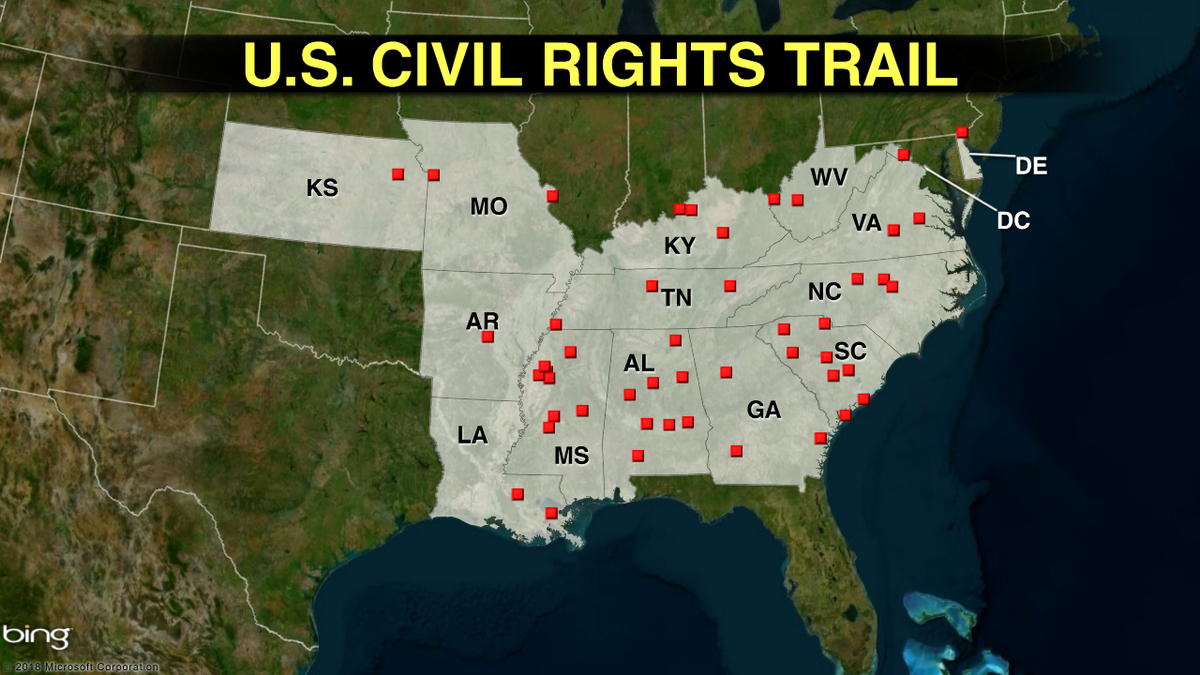Civil rights tourism effort links 110 pivotal landmarks
Website features pictures, 360-degree video, interviews and background details on historic sites.
A half-century after Dr. Martin Luther King Jr.’s assassination, the very states that clung to racial segregation are now coming together to expand people’s knowledge on the Civil Rights Movement.
A dozen Southern tourism departments unveiled a unified website highlighting 110 pivotal landmarks that led to the attainment of civil and human rights for African-Americans. Dubbed the U.S. Civil Rights Trail, the digital map of historic sites stretches from Topeka, Kan. to Wilmington, Del., including 14 states and Washington D.C.
“With this new development, people are going to be able to find out more truth about what happened to African-Americans, and yet how America is growing past that and beginning to acknowledge that we’re all human beings,” King’s niece, Alveda King said.

There are 110 sites on the U.S. Civil Rights Trail, touching 14 states and Washington D.C. Officials expect the list to expand over time. (Fox News)
WHY A TRIP TO CHARLESTON SHOULD BE ON EVERY TRAVELER'S ITINERARY
The interactive website, which features pictures, 360-degree video, interviews with foot soldiers and explanations of the historic sites, was the brainchild of Alabama's tourism director, Lee Sentell.
Sentell told Fox News that former National Park Service director Jonathan Jarvis challenged him and other historians two years ago to create an inventory of surviving civil rights landmarks. Sentell turned to Georgia State University (GSU), he said, which compiled a list of 60 sites and paved the foundation for the new U.S. Civil Rights Trail.
GSU researcher Dr. Glenn Eskew had already been collecting a list of locations that the federal government, state agencies and local communities themselves identified as "important civil rights sites" for a separate project.
'SERIAL STOWAWAY' ARRESTED FOR 10TH TIME AFTER SLIPPING PAST AIRPORT SECURITY
A dozen state tourism directors, who are members of TravelSouth USA, supplemented the remaining locations to reach a total of 110.
“2018 is a very good year for equalizing the plight of humanity."
Eskew says this list will continue to grow, adding that “every community has something because the fight took place in every community to alter America’s oppressive racial system.”
The trail highlights renowned historic sites, like the recently expanded Martin Luther King Jr. National Historic Park and King’s birth home in Atlanta.
The National Museum of African American History and Culture in Washington, D.C., and the home of Medgar Evers, who was a voting rights activist assassinated just after President John Kennedy proposed civil rights legislation, also serve as anchors along the trail.
But the tourism campaign is aimed at expanding people’s scope of the era, thus also recognizing lesser-known sites that shaped the Civil Rights Movement.
Howard High School of Technology made the list for its direct association to Brown v. Board of Education, which ruled racial segregation in public schools unconstitutional. In Kentucky, the birthplace of Whitney M. Young Jr. commemorates the civil rights leader’s tireless work to end employment discrimination.

The first NAACP field secretary Medgar Evers was assassinated at his home in 1963. It is now a museum, restored to look as it did when the Evers family lived there. (U.S. Civil Rights Trail)
“This movement didn’t just happen in the cities, it happened all across the region,” director of Georgia tourism Kevin Langston said. “You have to get out and see some of those sites off the main road to experience that.”
By providing this umbrella website, tourism directors hope to spark a domino effect in visitors’ interest, getting tourists to not only cross state lines but oceans to learn more about the volatility in the 1950s and 1960s.
FOLLOW US ON FACEBOOK FOR MORE FOX LIFESTYLE NEWS
The Southern tourism departments have received “calls all week this week from Europe about the trail,” according to Langston. They are currently working with European tour operators on developing a trip experience based on the U.S. Civil Rights Trail.
Sentell is expecting a conservative increase in visitor attendance at trail sites — estimating 13 million visits in 2018 and $1.62 billion in spending between tickets, travel and souvenirs. He says the heightened interest stems from the introduction of the website and the 50th anniversary of King’s death.
“2018 is a very good year for equalizing the plight of humanity,” Alveda King said. “As we explore the African-American history, what else will be uncovered?”





















